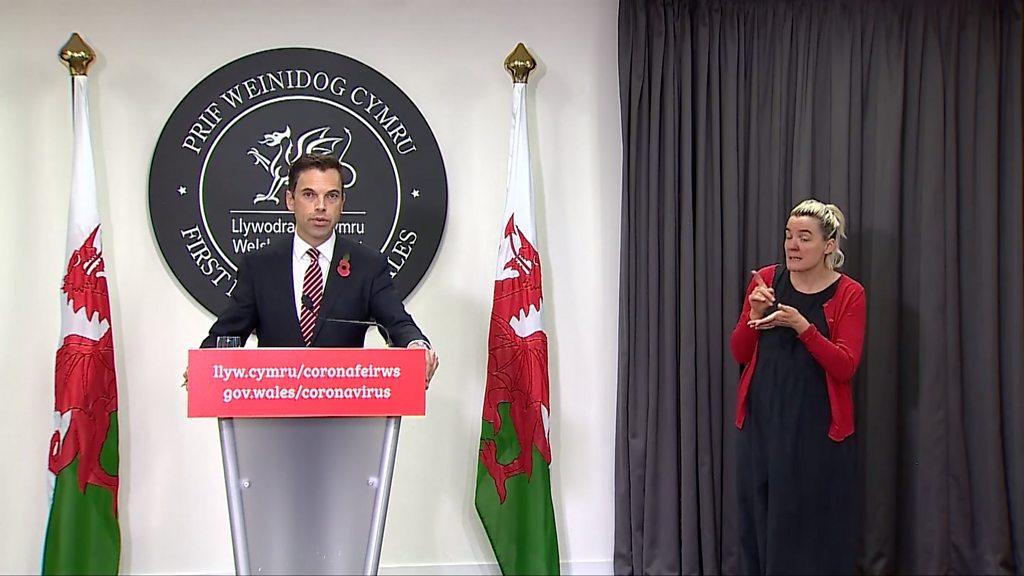Covid-19: Wales could see more than 44,000 long-term unemployed
- Published
Apprentices miss out as pandemic cuts work
Wales is potentially facing levels of unemployment not seen since the recession of the early 1990s, according to new modelling.
Research commissioned by the BBC suggests the number of long-term jobless could rise to about 44,000 people.
That would be a four-fold increase on the current number.
The Welsh Government said investment was needed to soften the blow, but tough times lie ahead.
While the rate of unemployment is broadly similar in Wales and England, unemployment in Wales has risen at double the rate across the border since the beginning of 2020.
There has been a 41% increase in Wales compared to just 18% in England - meaning an estimated additional 20,000 people are looking for work in Wales.
And despite recent good news about vaccines and a possible end to lockdowns in the New Year, experts say there could be worse to come.
Unemployment worse than 2008 crisis
David Hagendyk, director of the Learning and Work Institute in Wales, has been modelling how the country's unemployment figures could look.
For the long-term unemployed, the picture is bleak. Currently, there are 11,000 people in that category in Wales, but Mr Hagendyk said that figure could rise steeply.
"Our modelling shows that could go up and be between 29,000 or 67,000 people being long-term unemployed.
"That gives us a mid-range of about 44,000.
"It blows out of the water the 2008 financial crisis in terms of long-term unemployment numbers.
"It takes us back to the early 1990s and the kind of recession we had then."
Mr Hagendyk said that, while the numbers were eye-catching, it was important to remember the human stories behind them.
"These are real people with real jobs, real families and we know there is a long-term scarring impact.
"It's absolutely critical that the government acts quickly in order to stop this kind of modelling potential that we might see."
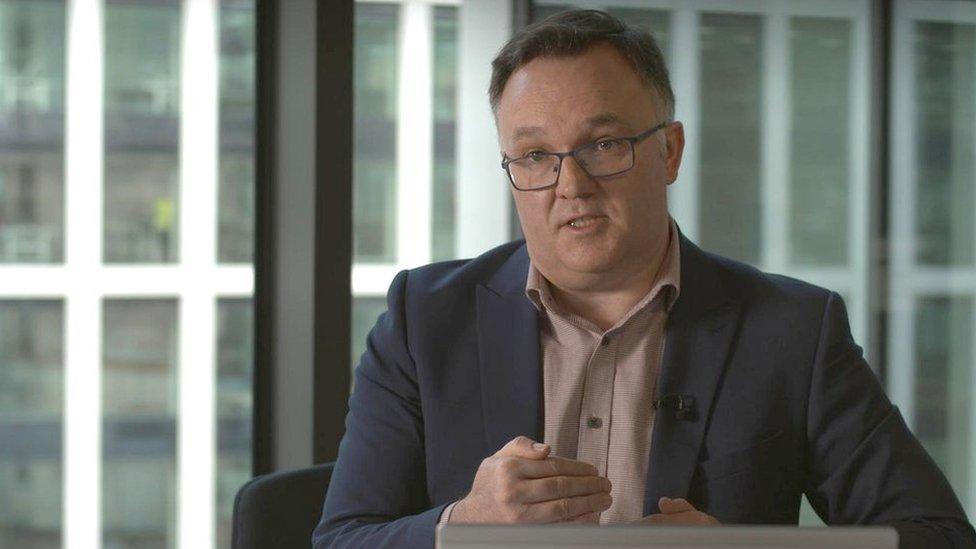
David Hagendyk says government action is needed now to avoid huge rises in the long-term unemployed number in Wales
Career on hold
James Aubrey said he wanted to be a pilot for as long as he could remember, tailoring his exams and work experience to that goal.
He had to fund a two-year training course - borrowing £100,000 which he has to pay back over the next decade.
That shouldn't have been a problem for the 22-year-old from Cardiff, but the aviation industry has been one of the hardest hit by the pandemic.

James Aubrey borrowed £100,000 to train as a pilot
"The starting salaries most airlines were offering was about £40,000 which meant there was enough to pay off the loan and be able to live as well," said James.
But pilots are being laid off rather than being recruited, so James has decided to look for a job in retail - where he worked before his training - to ensure he has an income in the short-term.
"The loan is bonded to my parents' house," he said.
"So it means there's an added extra bit of pressure on top just to meet those repayments, just to make sure it doesn't affect my family as well as me."
Though still determined to work as a pilot, James is concerned it could take him far longer than planned to get back into aviation.
Welsh economy 'vulnerable'
The Welsh Government said it had allocated more than £1bn to support businesses and protect jobs during the pandemic.
Despite this, unemployment is rising faster in Wales than in England.
Mr Hagendyk said the underlying reasons for that lie in the way some sectors employ more people in Wales.
"Our research has shown that about one in five workers here in Wales are working in shutdown sectors - the parts of the economy that have been most affected by the first lockdown," he said.
"These are companies in hospitality and tourism, aviation and high street retail - that's about a quarter of a million workers here in Wales."
Because so many people work in these vulnerable sectors, it does not bode well for the future, said Mr Hagendyk.
"They're more likely to be letting people go, making redundancies," he said.
"They're also most likely not to be hiring new people."
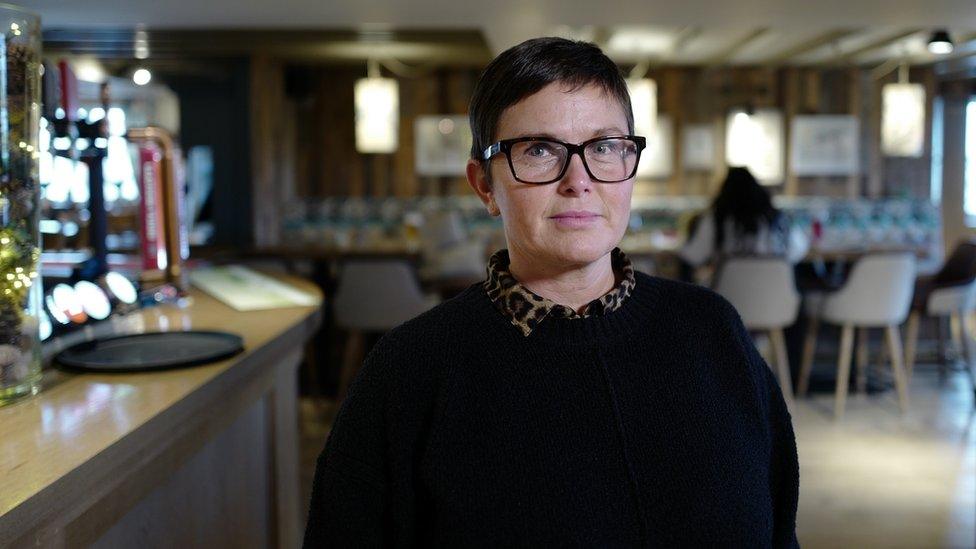
Pub manager Heidi Bakewell had taken on and trained new staff
Manager 'can't sleep'
Across Wales the hospitality sector has been amongst the hardest hit - takings have plummeted for hotels, pubs and restaurants.
On the Llyn Peninsula in Gwynedd, the Bryncynan pub began the year by spending £1m on a refit.
The pub's manager Heidi Bakewell was forecast to take a similar amount in revenue over the year but in reality the pub has taken about a quarter.
Heidi had also taken on and trained new staff, with some facing losing their jobs because restrictions and lockdowns meant the pub couldn't trade normally.
"I haven't slept the last couple of nights just through thinking, what are we going to do?
"Do we share the hours out, so they all get a few hours? It doesn't really work then because it's not enough for them to live on.
"We've still got three chefs. I think we've got 11 out-front staff still.
"Those numbers will probably go, I would say, to two chefs at the very most and we'll probably cut our front staff, maybe down to five."
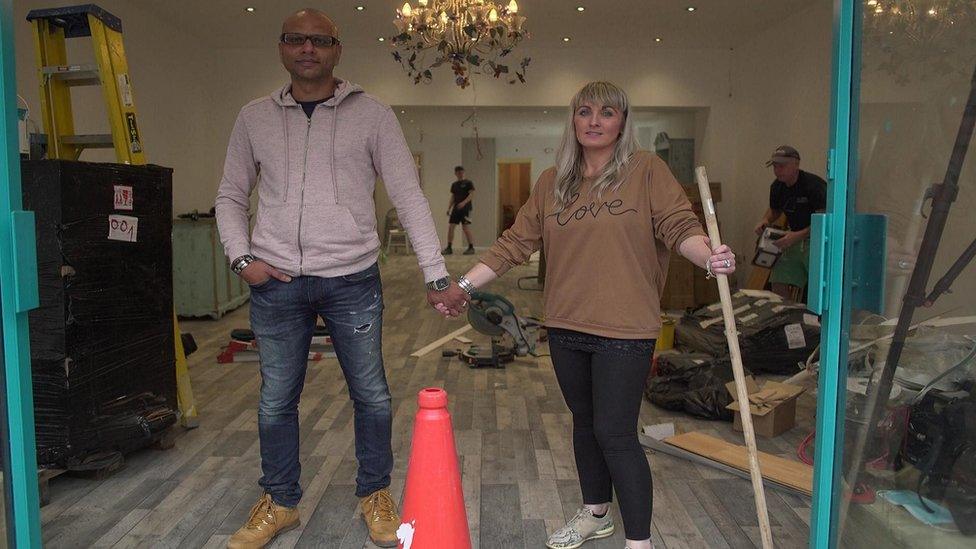
It's been a challenging year for Emma and Rez Jamal who run Kookoo Madame
'Awful' redundancies decision
When Pontypridd fashion boutique Kookoo Madame reopened in September, people queued down the street for the few jobs on offer.
Among the hopefuls hoping to land a shop floor job were senior managers, people with degrees and those who were qualified but couldn't get into their chosen industries.
For owners Emma and Rez Jamal, 2020 has thrown up many obstacles.
First they were flooded out by Storm Dennis, and as they recovered from that, the first lockdown came.
To save their business, they moved to a new premises and had to choose between paying for the move or topping up staff wages when furlough ended.
"We had to make some redundancies, which was a really tough decision to make," said Emma.
"They were our staff who'd been with us for quite some time.
"It was awful, absolutely awful. I wouldn't want to go through it again."
Although they were able to open in September, the firebreak meant they had to shut again.
"Everybody's scared, everybody's worried, nobody knows what's round the corner," said Emma.
'Investment is key'
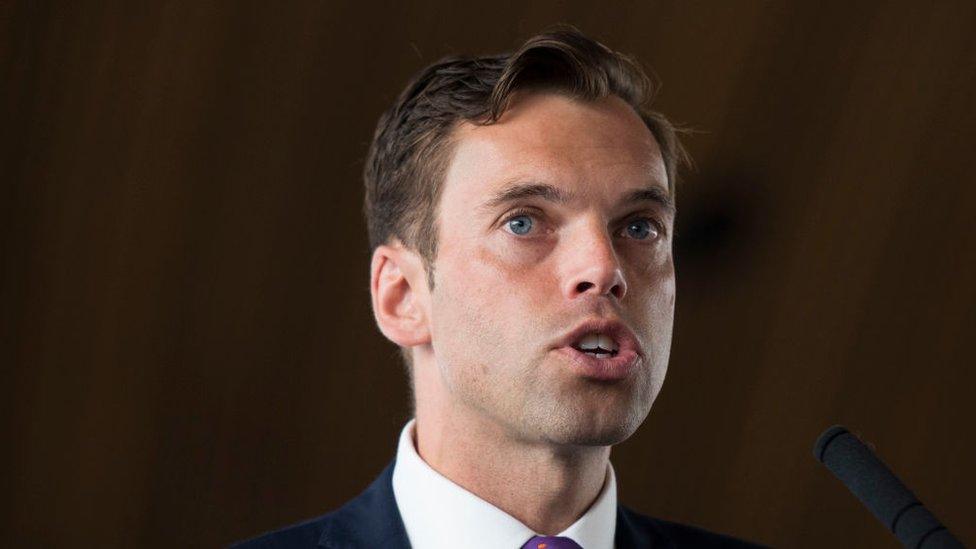
Wales' Economy Minister Ken Skates has called for "jobs, jobs and more jobs"
Welsh Economy Minister Ken Skates said the way to combat the testing times to come was to invest in "jobs, jobs and more jobs".
He said: "We've a proven track record in investing in people and supporting people through the most difficult economic times.
"We are confident that we have got plans, policies and schemes in place to prevent the devastating long-term scars that mass, long-term unemployment can inflict on our country."
But Mr Skates admitted none of the forecasts he had seen had been "rosy".
"There is no forecast that suggests we will come out of this incredibly rapidly and are going to instantly bounce back," he said.
Huge retraining cost
Many people across Wales face the prospect of having to learn a new profession as jobs dwindle.
Mr Hagendyk said to train even half the number of people who could end up long-term unemployed would be hugely expensive, possibly costing as much as £218m.
"This is investment above and beyond what we have already seen going into schools and colleges, so this is new money," he said.
"We have seen the Welsh Government expand training college places and apprenticeships to try to offset some of this challenge.
"But I think at the moment the scale of the response is not sufficient to meet the scale of the challenge."
The Welsh Government said it would need additional funding from Westminster to help with retraining.
Additional funding to support skills has been announced by the UK government for England, and Wales will receive a consequential through the Barnett formula. However, there are fears that this funding alone will fall far short of what might be needed.
BBC Wales Investigates The Price of Lockdown on Monday 30 November at 20:30 GMT on BBC One Wales and afterwards on iPlayer.
- Published24 November 2020

- Published9 November 2020
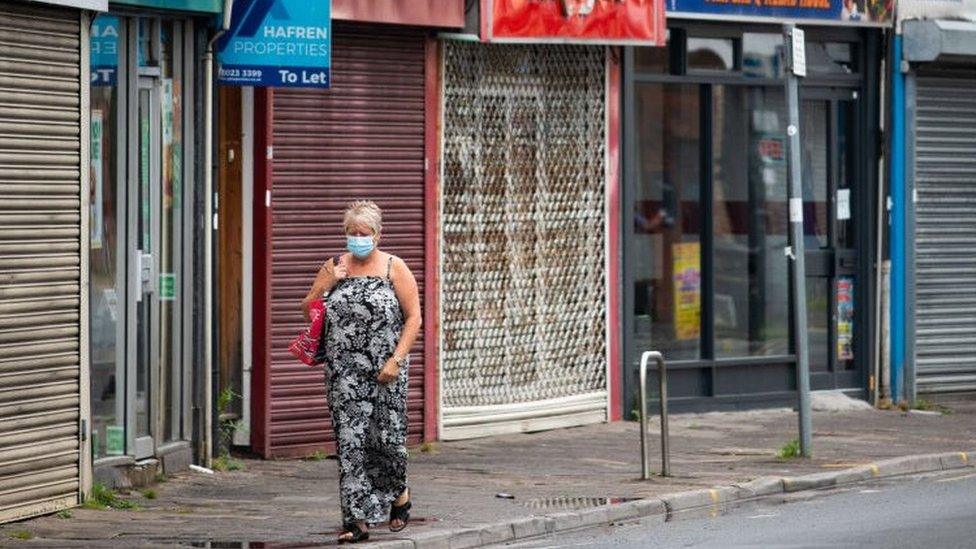
- Published5 November 2020
